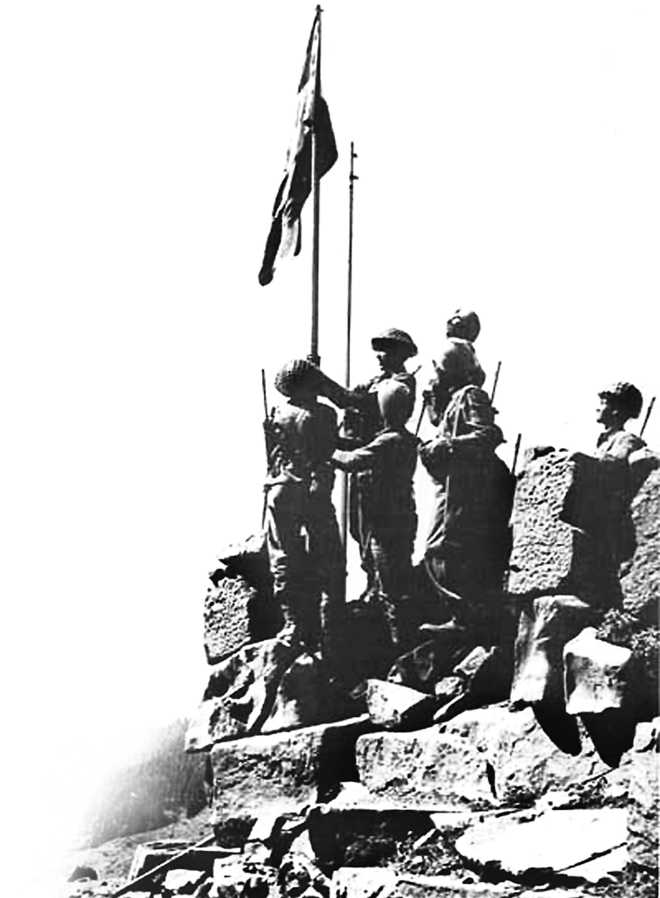
Harish Khare
 FIFTY years ago this month the Indian nationhood was tested. Pakistan chose to initiate a war against India. This was the first grave crisis the country faced without Jawaharlal Nehru at the helm.
FIFTY years ago this month the Indian nationhood was tested. Pakistan chose to initiate a war against India. This was the first grave crisis the country faced without Jawaharlal Nehru at the helm.
The country was still reeling under the setbacks on the India-China border, but the physical locale of that conflict was on the sparsely populated periphery. This time around, the country was called upon to defend itself against an adversary who sought to inflict damage in the geographical heart of India.
Pakistan had astutely chosen to strike at a time when India seemed most vulnerable. Let it be recalled it was a time when India was flirting with tentativeness. Nehru had passed away, there was a new prime minister who was yet to carve out a place for himself in the public imagination, and, whose authority was being snipped at from within the ruling party. The economic situation was defined by a foreign exchange crisis and food shortages. If the Naga agitationists were being difficult in the North-East, the Kashmir valley was in plain disquiet. And, then, in the third week of January, 1965, came the language implosion.
The Constitution had envisaged that as of January 26, 1965, the country would switch over from English to Hindi as the official language. The entire 'South' erupted, with Madras being the epicentre of a massive political earthquake. Suddenly the very ability of “the Centre to hold” was in doubt. Internally, the democratic mechanisms produced conciliation and compromises; but, the outsiders seemed to have drawn wrong conclusions about Indian resilience.
Perhaps the most erroneous inference was drawn by Pakistan's president, Field Marshal Ayub Khan, who probably saw in the diminutive Lal Bahadhur Shastri a weakling and a pushover. Ayub and his generals had initiated a probing mission in the Rann of Kutch, and though India responded adequately, the matter ended up in international arbitrator's chambers.
Ayub and company were probably encouraged in their adventurism by a devious British foreign policy establishment. The British, led by that conniving mind, Duncan Sandys, were smarting under a rebuff from US President John F. Kennedy, who had refused to accept the British argument that the West should take advantage of India's trouble with China to impose a Kashmir settlement. The Brits were active again, lending a conspiratorial ear to Pakistan and its mischievous propaganda that a “revolution” was round the corner in Kashmir.
When Pakistan pushed India to the wall, Shastri turned out to be the man of the moment. He allowed the Indian armed forces a free hand to roll back the Pakistani aggression. And, then, on August 13, he went on air and bluntly told Pakistan: “I want to state categorically that force will be met with force and aggression against us will never be allowed to succeed.” Two days later, from the ramparts of the Red Fort, he made himself crystal clear. He remained unfazed even in the face of a Chinese ultimatum.
The “war” lasted 48 days. And, then the diplomacy took over, leading to the “peace” at Tashkent. Perhaps China was the only long-term winner in this conflict. Beijing cleverly sensed Pakistani bitterness at American even-handedness and stepped in the breach. India was now saddled with a very heavy strategic burden: a China-Pakistan alliance.
The 1965 War was not a war India initiated but it turned out to be a war India needed. It provided just the spark that reinvigorated our national arrangement. As a contemporary observer noted presciently: “The fiery ordeal had cleansed the nation's soul and forged a rare unity among the people. Through the valour and sacrifices equally of Hindu, Muslim, Sikh, Christian, Anglo-Indians and Parsi youths and the Indian armed forces' sterling performance in the field of battle, that miracle had been wrought. It further underscored the inherent strength of a composite, secular state that is India.”
India was tested. It came out with flying colours, on and off the battle field.
Read more in '50 Years of 1965 War' special:



























